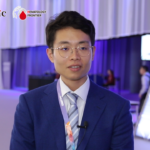
The 2024 Annual Meeting of the European Society for Medical Oncology (ESMO) was recently held in Barcelona, Spain. As one of the top international conferences in the field of oncology, it gathered experts and scholars from around the world to share the latest research findings and explore future development directions. During this conference, several landmark studies in the field of hematologic malignancies were presented, providing valuable insights and references for current clinical practice and future research. Hematology Frontier invited Dr. Annarita Conconi from the University of Eastern Piedmont in Italy, one of the Chairs of the Mini Oral Session on Hematologic Malignancies, to comment on these landmark studies and to look ahead at the future trends in hematologic oncology.Hematology Frontier: At this conference, you participated in the discussion of several studies (813MO, 814MO, 815MO, 816MO). Could you please provide your commentary on these studies and elaborate on their significance in advancing the development of hematological malignancies?
Dr. Annarita Conconi: At this year’s ESMO conference, I participated in discussions on four studies covering different topics. The first study involved a Phase 1 clinical trial of a novel vaccine combined with a Bruton’s tyrosine kinase (BTK) inhibitor for treating chronic lymphocytic leukemia (CLL). The goal was to enhance the depth of response in these patients. BTK inhibitors are the cornerstone treatment for high-risk CLL patients, but the complete response rate with monotherapy is relatively low. Reversing the T-cell dysfunction commonly observed in CLL may help create a synergistic effect with the vaccine therapy.
The second study focused on the molecular analysis of immunoprivileged lymphomas, uncovering new findings about these rare entities, especially extranodal lymphomas like primary breast diffuse large B-cell lymphoma (DLBCL). This study provides new evidence for their proper classification and identification as distinct disease entities.
The third study was a Phase 2 clinical trial evaluating the combination of orelabrutinib, a BTK inhibitor, with obinutuzumab in newly diagnosed marginal zone B-cell lymphoma. It showed interesting preliminary efficacy results in terms of clinical activity.
The fourth study centered on the clinical impact of combining clonal hematopoiesis with monoclonal B-cell lymphocytosis (MBL) and the associated risk of developing lymphoid malignancies.
Hematology Frontier: As a long-time researcher in the field of molecular biology and clinical trials for non-Hodgkin’s lymphoma, could you please discuss the current significant advancements in this area and how these advancements have altered patients’ treatment outcomes and survival?
Dr. Annarita Conconi: The most relevant advancements in the treatment of hematological malignancies over the last decades have been the introduction of targeted therapies and immunotherapies, including both B and T-cell-based immunotherapies. These advances are changing how we approach treating patients, leading towards more frequent chemotherapy-free strategies in both treatment-naive and relapsed/refractory diseases.
Hematology Frontier: With the rapid development of molecular biology technologies, hematologic malignancies have entered the era of precision medicine. What challenges do you believe the field still faces in achieving precision diagnosis and treatment for blood cancers? What research directions are worth paying attention to in the future?
Dr. Annarita Conconi: Over the past few decades, our focus has been on identifying variables and factors affecting chemotherapy resistance, which has been the primary treatment approach available. However, we are now transitioning to immunotherapies—both T-cell-based and B-cell-based. All biological research should now aim to define immune resistance. We must identify the factors that influence patient resistance to the anti-tumor effects of immune-based therapies.


